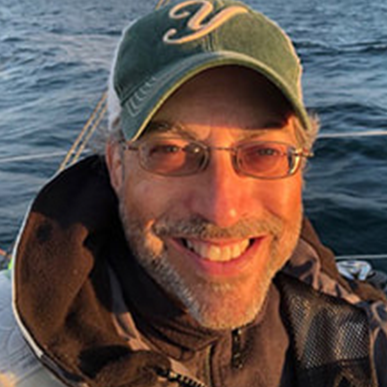“Complacency can be tricky. On one hand, you don’t want to think about the treatment you had; on the other hand, you need to.”
Describe your life when you were diagnosed with Hodgkin lymphoma at age ten.
I was swimming competitively year-round and a pretty active kid. My symptoms arose when, as an altar boy, I became overheated on the altar and felt like I was going to faint. The pediatrician diagnosed anemia. However, soon I was hyperventilating when I swam across the pool.
A chest x-ray showed a spot on my lungs. This led to a biopsy; I had a swollen lymph node on my neck and was diagnosed with Hodgkin’s stage 4A.
You headed into treatment.
I went for weekly, eight-hour chemo sessions. We’d get up early for the long drive, I wouldn’t eat, and I’d usually get sick at the same point on the Schuylkill Expressway heading to Children’s Hospital of Philadelphia. It wasn’t the chemo that gave me the dry-heaves; it was the thought of going to the hospital.
I’d spend all day sitting with the other kids who had leukemia and other cancers. That’s where I learned to empathize as I saw kids whose disease had progressed much further than mine. I wasn’t the most devoutly religious kid, but I grew up with a foundation of personal faith and strength that really helped me through treatment. I relied on it.
Then treatment switched over to mantle radiation for a few months before I went back for more chemo.
What happened when your treatment was over?
My family bought an old boat, and I started water-skiing a lot! My father was an airline pilot, so I grew up with a sense of adventure. When I was in high school my family hosted a young man from Peru, and I went to Peru that summer. That same sense of adventure took me to Denmark as a junior in high school and to the University of Hawaii for college.
I went to work for United Airlines, rode mountain bikes, surfed, bodysurfed and scuba-dived. I moved to California and began racing sailing yachts. I changed jobs in 1997, moved to Chicago and met my wife.
Did late effects catch up with you?
Complacency can be tricky. On one hand, you don’t want to think about the treatment you had; on the other hand, you need to. Had I known what I know now, I would have started seeing an oncologist during the early 2000s. I finally saw a cardiologist around 2006, and she noted a potential diagnosis of aortic stenosis. This was not conveyed to me, and I felt fine.
In 2009, my wife and I were laid off and decided to go into yachting full-time. We got additional credentials in Florida and were hired by the owner of a mega-yacht who also owned an NFL team. In the span of two weeks—just from the sheer activity—I passed out twice. I saw a cardiologist who said: you have aortic stenosis, and you need heart surgery. We’d arrived in Florida with no health insurance, we were fired, so we packed our bags and flew back to Chicago.
Fortunately, I discovered Illinois had insurance that covered pre-existing conditions, and I checked all the boxes. I had a cardiac MRI scheduled for March 9 and the surgery scheduled for March 11. I received a letter telling me my coverage would start on March 8. I’m convinced it wasn’t just serendipity that lined everything up perfectly. I had an aortic valve replacement to repair radiation damage, was up and walking the next morning and out of the hospital in less than six days.
What happened next?
About two years later, symptoms began; I became breathless when I walked our dog. I was diagnosed with heart failure. I began to study heart failure in cancer survivors and met Dr. Tochi Okwuosa, a cardio-oncologist at Rush University Medical Center. I got pretty sick waiting to schedule surgery with my original surgeon; we all agreed it was best to have him do it, as he already knew my anatomy. Dr. Tochi was instrumental in helping select mechanical valves for the surgery; they are less susceptible to inflammation and infection than tissue valves. A good reason to have a cardio-oncologist on your team. They replaced the aortic valve, mitral valve and repaired my tricuspid valve.
The surgery took him 11.5 hours; I went into the OR on Monday and woke up on Wednesday. It was way more complicated than my surgeon anticipated due to the amount of scar tissue. He had to re-stop my heart, take one of the valves out, clean off the scar tissue and put in grafts. I was in the hospital for 1.5 months before heading to a rehab. When I got home, I returned to sailing and my financial career. I’ve captained pirate ships and a couple of America’s Cup yachts on the Chicago lakefront.
I continue to see Dr. Tochi, who can look at my “big picture” from the perspective of a long-term cancer survivor. What I’ve learned is that cardio-oncology is about the specific care that cancer survivors should and need to think about for a better quality of life. For example, I didn’t realize that tissue valves could contract endocarditis.
Do you have advice for individuals who were diagnosed recently or years ago?
Pay attention to your body; it tells you things. I delayed doing that in the past. Don’t think you can over-react; your under-reaction could be the problem. If a cardio-oncologist isn’t part of your team, find one—even if it’s through telehealth. A traditional cardiologist isn’t going to look at you the same way.
